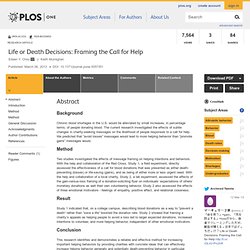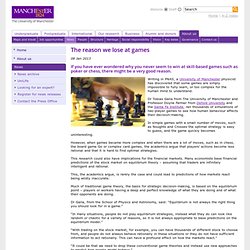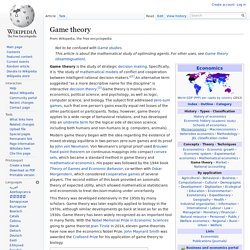

How Google Is Cleaning The Web Of Comment Spam. Prisoner's Dilemma In Real Life. The Second National Risk and Culture Study: Making Sense of - and Making Progress In - The American Culture War of Fact by Dan Kahan, Donald Braman, Paul Slovic, John Gastil, Geoffrey Cohen. Dan M.

Kahan Yale University - Law School; Harvard University - Edmond J. Safra Center for Ethics Donald Braman George Washington University - Law School; Cultural Cognition Project Paul Slovic Decision Research; University of Oregon - Department of Psychology John Gastil Pennsylvania State University Geoffrey L. University of Colorado - Department of PsychologyOctober 3, 2007 GWU Legal Studies Research Paper No. 370 Yale Law School, Public Law Working Paper No. 154 GWU Law School Public Law Research Paper No. 370 Harvard Law School Program on Risk Regulation Research Paper No. 08-26 Abstract: Cultural Cognition refers to the disposition to conform one's beliefs about societal risks to one's preferences for how society should be organized.
Number of Pages in PDF File: 23 Keywords: cultural cognition, risk perception, risk regulation, nuclear power, global warming, terrorism, gun control, school shootings, HPV, nanotechnology working papers series Suggested Citation. Life or Death Decisions: Framing the Call for Help. Background Chronic blood shortages in the U.S. would be alleviated by small increases, in percentage terms, of people donating blood.

The current research investigated the effects of subtle changes in charity-seeking messages on the likelihood of people responses to a call for help. We predicted that “avoid losses” messages would lead to more helping behavior than “promote gains” messages would. Method Two studies investigated the effects of message framing on helping intentions and behaviors. Result Study 1 indicated that, on a college campus, describing blood donations as a way to “prevent a death” rather than “save a life” boosted the donation rate. Conclusion This research identifies and demonstrates a reliable and effective method for increasing important helping behaviors by providing charities with concrete ideas that can effectively increase helping behavior generally and potentially death-preventing behavior in particular. Figures. The reason we lose at games. 08 Jan 2013 If you have ever wondered why you never seem to win at skill-based games such as poker or chess, there might be a very good reason.

Writing in PNAS, a University of Manchester physicist has discovered that some games are simply impossible to fully learn, or too complex for the human mind to understand. Dr Tobias Galla from The University of Manchester and Professor Doyne Farmer from Oxford University and the Santa Fe Institute, ran thousands of simulations of two-player games to see how human behaviour affects their decision-making.
In simple games with a small number of moves, such as Noughts and Crosses the optimal strategy is easy to guess, and the game quickly becomes uninteresting. However, when games became more complex and when there are a lot of moves, such as in chess, the board game Go or complex card games, the academics argue that players’ actions become less rational and that it is hard to find optimal strategies. Notes for editors For media enquiries please contact: Game theory.
Game theory is the study of strategic decision making.

Specifically, it is "the study of mathematical models of conflict and cooperation between intelligent rational decision-makers. "[1] An alternative term suggested "as a more descriptive name for the discipline" is interactive decision theory.[2] Game theory is mainly used in economics, political science, and psychology, as well as logic, computer science, and biology. The subject first addressed zero-sum games, such that one person's gains exactly equal net losses of the other participant or participants.
Today, however, game theory applies to a wide range of behavioral relations, and has developed into an umbrella term for the logical side of decision science, including both humans and non-humans (e.g. computers, animals). Modern game theory began with the idea regarding the existence of mixed-strategy equilibria in two-person zero-sum games and its proof by John von Neumann. Representation of games[edit] Extensive form[edit] [edit] Book Review: Dictator's Handbook.